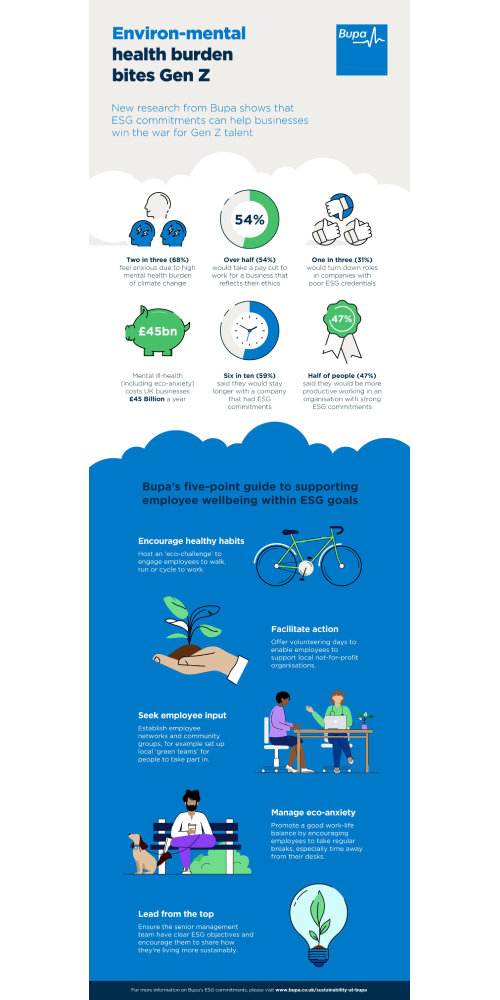- 18-22 year olds will turn down roles and take pay cuts to work with their preferred employers
- Two in three feel anxious due to high mental health burden of climate change
- In a hot labour market ESG commitments can help businesses win the war for talent
- Bupa ESG experts advise businesses to support employee wellbeing through ESG
Businesses demonstrating strong environmental, social and governance (ESG) commitments will win the war for Generation Z workers in 2022 as they face an increasing environ-mental health burden.
According to new data from Bupa, two in three Gen Zs (68%) are anxious about environmental issues – more than any other generation* - and a similar number (63%) feel the burden of climate change on their shoulders.
As they enter a hot labour market where competition for talent is fierce1, 64 per cent say it’s important that employers act on environmental issues, with a lack of action affecting the mental wellbeing of two in five (43%).
Crucially, Gen Z are prepared to prioritise their mental health over their earnings. One in three (31%) would turn down roles in companies with poor ESG credentials, and over half (54%) would take a pay cut to work for a business that reflects their ethics, on average sacrificing more than a quarter (27%) of their salary.
With mental ill-health costing UK businesses £45Bn a year2, the research suggests that engaging employees with sustainability commitments will support their physical and mental health, and provide growing value to businesses as Gen Z saturate the workforce and move up the career ladder.
Gen Z and the environ-mental health burden
Generation Z are more anxious than any other age group about a range of social and environmental issues:
- 63% of Gen Z feel the burden of climate change on their shoulders versus just 37% of Gen X and 28% of Boomers
- 63% of Gen Z are anxious about social justice issues like racism and homophobia, compared to 52% of Generation X and 43% of Baby Boomers
- 64% are anxious about poverty and inequality, compared to 59% of Gen X and 53% of Boomers
- And with the climate crisis and social injustice continuing to dominate the news agenda, 60% of Gen Z respondents said they expected their anxiety to increase in the future (versus only 46% of Gen X and 40% of Baby Boomers).
The Bupa data also shows that environmental and social commitments are a powerful tool in a challenging marketplace. Six in 10 Gen Zs (59%) and over half of people overall (52%) said they would stay longer with a company that had ESG commitments, as well as recommend it to others as a good place to work.
Employers with strong environmental and social commitments can also expect a boost to productivity - around half of people of all ages said they would be more engaged with their organisation overall (51%), more satisfied in their jobs (53%) and more productive (47%).
Dr Pablo Vandenabeele, Clinical Director for Mental Health at Bupa said: “ESG commitments really can have an impact on employee mental health, so it’s important that businesses take note. A high salary for work that feels meaningless can only satisfy one for so long, whereas feeling like we're contributing to the greater good and making a difference has a positive effect on our self-esteem. It can even reduce feelings of burnout, something that many people are struggling with after a tough couple of years.”
Sally Pain, Chief Sustainability Officer at Bupa said: “The pandemic has underscored the inextricable link between healthy people, a healthy planet, and business performance. And for Gen Z, workplace wellbeing is now a critical part of the ESG agenda.
“As skills shortages bite across many sectors and businesses face a challenging year ahead, it’s easy to think that social and environmental commitments are optional. Our research shows that they are quickly becoming critical to success. For companies who want to build and nurture future leaders for their business, investing in strong targets that connect with their employees’ personal values is vital.”
Supporting employers
Bupa’s workplace wellbeing experts have issued a five-point guide for employers who want to support their employees' wellbeing as part of their ESG goals.
Encourage habits that improve people and planet wellbeing
Support employees to make choices that are better for their wellbeing and the planet, e.g. reducing work travel, supporting greener options for active travel into work, moving to electric vehicles for company cars and providing healthier food in the office canteen that also has a lower carbon footprint. You could also encourage engagement by offering “eco-challenges” at work, e.g. a walk/run/cycle to work challenge. You can find more ideas through Bupa’s free to access sustainability hub, including articles and podcasts exploring how to make environmentally friendly behaviour changes that last.
Facilitate action
Encourage employees to engage with ESG activities at work, offering volunteering days and involvement in company or community sustainability initiatives. Communicate what the business is doing to meet its ESG goals and how employee contributions are having an impact.
Seek employee input
Employees will feel more engaged if they can help shape their company’s ESG actions. Establish employee networks and community groups for people to take part in.
Manage eco-anxiety
Thinking about sustainability can be overwhelming, and eco-anxiety is on the rise and a natural response to what is happening to our planet. Help employees to manage anxiety through supporting a good work-life balance. Encourage them to work within their working hours, spend time away from their desks and take regular breaks, whether they’re in the office or working from home. Spending time outside and getting close to nature has been shown to reduce symptoms of anxiety and depression.
Lead from the top
A culture of ESG starts from the top. Ensure senior management have clear ESG objectives and encourage them to share what they are doing, both at work and at home to be more sustainable.

For more information, images or interviews please contact [email protected]
Notes to editors
Research carried out by Opinium Research among 2,000 UK adults, weighted to be nationally representative, November 2021. The generational breakdown used throughout the study is as follows: Gen Z (18-22), Millennial (23-38), Gen X (39-54), Boomers (55-73), Silent (74+).
* 68% of Gen Z are anxious about climate change compared to 63% of Millennials, 62% of Gen X and 65% of Baby Boomers*
- https://www.ft.com/content/463f4fbd-3a50-45b5-891c-5cb5ba623df8
- https://www2.deloitte.com/uk/en/pages/press-releases/articles/poor-mental-health-costs-uk-employers-up-to-pound-45-billion-a-year.html
About Bupa
Bupa's purpose is helping people live longer, healthier, happier lives and making a better world.
We are an international healthcare company serving over 31 million customers worldwide. With no shareholders, we reinvest profits into providing more and better healthcare for the benefit of current and future customers.
We directly employ around 85,000 people, principally in the UK, Australia, Spain, Chile, Poland, New Zealand, Hong Kong SAR, Turkey, Brazil, Mexico, the US, Middle East and Ireland. We also have associate businesses in Saudi Arabia and India.



